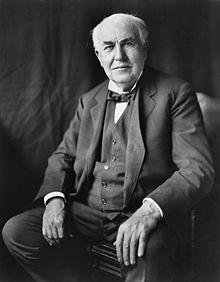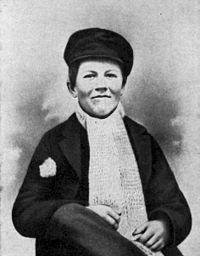Thomas Edison
Thomas Alva Edison (February 11, 1847 – October 18, 1931) was an American inventor and businessman, who has been described as America's greatest inventor.[2] He developed many devices that greatly influenced life around the world, including the phonograph, the motion picture camera, and the long-lasting, practical electric light bulb. Dubbed "The Wizard of Menlo Park",[3] he was one of the first inventors to apply the principles of mass production and large-scale teamwork to the process of invention, and because of that, he is often credited with the creation of the first industrial research laboratory.

Edison was a prolific inventor, holding 1,093 US patents in his name, as well as many patents in the United Kingdom, France, and Germany. More significant than the number of Edison's patents was the widespread impact of his inventions: electric light and power utilities, sound recording, and motion pictures all established major new industries worldwide. Edison's inventions contributed to mass communication and, in particular, telecommunications. These included a stock ticker, a mechanical vote recorder, a battery for an electric car, electrical power, recorded music and motion pictures. His advanced work in these fields was an outgrowth of his early career as a telegraph operator. Edison developed a system of electric-power generation and distribution[5] to homes, businesses, and factories – a crucial development in the modern industrialized world. His first power station was on Pearl Street in Manhattan, New York.

Edison as a boy
Thomas Edison was born in Milan, Ohio, and grew up in Port Huron, Michigan. He was the seventh and last child of Samuel Ogden Edison, Jr. (1804–1896, born in Marshalltown, Nova Scotia) and Nancy Matthews Elliott (1810–1871, born in Chenango County, New York).[6] His father, the son of a Loyalist refugee, had moved as a boy with the family from Nova Scotia, settling in southwestern Ontario (then called Upper Canada), in a village known as Shewsbury, later Vienna, by 1811. Samuel Jr. eventually fled Ontario, because he took part in the unsuccessful Mackenzie Rebellion of 1837.[7] His father, Samuel Sr., had earlier fought in the War of 1812 as captain of the First Middlesex Regiment. By contrast, Samuel Jr.'s struggle found him on the losing side, and he crossed into the United States at Sarnia-Port Huron. Once across the border, he found his way to Milan, Ohio. His patrilineal family line was Dutch by way of New Jersey; the surname had originally been "Edeson."[8]
Edison only attended school for a few months and was instead taught by his mother.[9] Much of his education came from reading R.G. Parker's School of Natural Philosophy and The Cooper Union for the Advancement of Science and Art.[10]
Edison developed hearing problems at an early age. The cause of his deafness has been attributed to a bout of scarlet fever during childhood and recurring untreated middle-ear infections. Around the middle of his career, Edison attributed the hearing impairment to being struck on the ears by a train conductor when his chemical laboratory in a boxcar caught fire and he was thrown off the train in Smiths Creek, Michigan, along with his apparatus and chemicals. In his later years, he modified the story to say the injury occurred when the conductor, in helping him onto a moving train, lifted him by the ears.[11][12]
Edison's family moved to Port Huron, Michigan, after the railroad bypassed Milan in 1854 and business declined.[13] Edison sold candy and newspapers on trains running from Port Huron to Detroit, and sold vegetables. He briefly worked as a telegraph operator in 1863 for the Grand Trunk Railway at Stratford, Ontario railway at age 16. He was held responsible for a near collision. He also studied qualitative analysis and conducted chemical experiments on the train until he left the job.[14][15]
Edison obtained the exclusive right to sell newspapers on the road, and, with the aid of four assistants, he set in type and printed the Grand Trunk Herald, which he sold with his other papers.[15] This began Edison's long streak of entrepreneurial ventures, as he discovered his talents as a businessman. These talents eventually led him to found 14 companies, including General Electric, which is still one of the largest publicly traded companies in the world.[16][17]
Edison is one of the foundation of science in past decade. I wonder what the world will be like without his invention.
I think the world will be dark without his invention,btw thanks for vote and comment